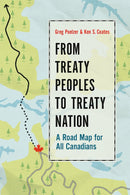Description
From Treaty Peoples to Treaty Nation: A Road Map for All Canadians begins with the principle that Canada is a country founded on relationships and treaties between Indigenous peoples and newcomers. Although recent court cases have strengthened Aboriginal rights, the cooperative spirit of the treaties is being lost as Canadians engage in endless arguments about First Nations issues. Greg Poelzer and Ken Coates breathe new life into these debates by looking at approaches that have failed and succeeded in the past and offering all Canadians - from policy makers to concerned citizens - realistic steps forward. The road ahead is clear: embracing the rights and aspirations of Aboriginal peoples will ensure a better future for all Canadians. Authors, Poelzer and Coates, begin by assessing the works of a variety of scholars including John Burrows, Charles Taylor, Alan Cairns, Emma LaRocque, Calvin Helin, Taiaiake Alfred, the late Patricia-Angus, James Youngblood Henderson, Bonita Beatty, Menno Boldt, and Tom Flanagan. After the various perspectives of First Nations and settler thinkers, chapter 6 examines the various models of Aboriginal success stories in Culture and Education, Business and Entrepreneurship, and Governance and Civic Engagement. Creating steps to social, political, and economic equality, the authors tackle examples of Indigenous Peoples and Global Issues; the Equality of Status; Developing Citizenship and a Commonwealth of Aboriginal Peoples; Aboriginal Self-Government; and Community-Based Economic Well-Being. The final goal is set on Finding Common Economic Ground among all Canadians. The authors offer broad topics over time by providing all readers with an accessible approach that is both readable and based on common-sense ideas. Ideal for secondary level courses about self-government, global Indigenous Peoples, and current issues, as well as introductory college and university Indigenous Studies programs. Highly recommended.


